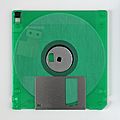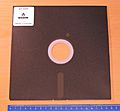Floppy disk facts for kids
The floppy disk is a type of storage device that was very popular for computers. It's a small, flat disk that uses magnetism to save information. Think of it like a mini portable hard drive!
People used floppy disks to move files between different computers or laptops. Some older digital cameras, music instruments, and even old computer game consoles also used them. To use a floppy disk, you needed to put it into a special machine called a floppy disk drive. This drive would read the information on the disk or save new information onto it.
Floppy disks could not hold as much data as modern devices like CD-ROMs or USB flash drives. A common 3½ inch floppy disk could store about 1.44 megabytes of data. This was usually enough for simple text documents, but not for large pictures or videos.
In the late 1980s, a special floppy disk was made that could hold 2.88 MB of data, but it wasn't very popular. Later, in the 1990s, bigger floppy disks like the Zip drive and Jaz drive (made by Iomega) came out. These could store much more data.
Floppy disk technology first appeared in the early 1970s with the 8-inch floppy. Over time, newer storage methods like USB flash drives replaced them. Floppy disks and their drives are not made anymore, but you can still find them if you look!
What is a Floppy Drive?
A floppy drive is the part of a computer that reads and writes information on a floppy disk. On older computers using systems like DOS or Windows, these drives were often called "A" or "B" drives.
You could connect a floppy drive to your personal computer (PC) or have it built right inside. It allowed you to store files on a floppy disk and then easily carry them to another computer. Once the disk was in the drive, you could open and change the files saved on it.
How Much Data Could Floppy Disks Hold?
Floppy disks came in different sizes and could hold different amounts of data over the years. Here's a look at how their storage capacity changed:
| Floppy disk type | Year it came out | Storage capacity (binary kilobytes if not stated) |
Advertised capacity |
|---|---|---|---|
| 8-inch (read-only) | 1969 | 80 | ← |
| 8-inch | 1972 | 187.5 | 1.5 Mbit |
| 8-inch | 1973 | 256 | 256 KB |
| 8-inch DD | 1976 | 500 | 0.5 MB |
| 5¼-inch | 1976 | 223 | ← |
| 8-inch double sided | 1977 | 1200 | 1.2 MB |
| 5¼-inch DD | 1978 | 360 | 360 KB |
| 3½-inch HP single sided |
1982 | 280 | 264 KB |
| 3-inch | 1982? | 360? | ← |
| 3½-inch (DD at release) | 1984 | 720 | 720 KB |
| 5¼-inch QD | 1984 | 1200 | 1.2 MB |
| 3-inch DD | 1984? | 720? | ← |
| 3-inch Mitsumi Quick Disk |
1985 | 128 to 256 | ← |
| 2-inch | 1985? | 720? | ← |
| 5¼-inch Perpendicular | 1986? | 100 MiB | ← |
| 3½-inch HD | 1987 | 1440 | 1.44 MB |
| 3½-inch ED | 1991 | 2880 | 2.88 MB |
| 3½-inch LS-120 | 1996 | 120.375 MiB | 120 MB |
| 3½-inch LS-240 | 1997 | 240.75 MiB | 240 MB |
| 3½-inch HiFD | 1998/99 | 150/200 MiB? | 150/200 MB |
| Acronyms: DD = Double Density; QD = Quad Density; HD = High Density ED = Extra-high Density; LS = Laser Servo; HiFD = High capacity Floppy Disk | |||
| Note: Some dates and capacities need more checking. Other listed capacities are for standard computer formats. | |||
Images for kids
-
A USB floppy drive. You can plug this into a modern computer.
-
Different data storage media, including a Flash drive, CD, tape drive, and CompactFlash.
See also
 In Spanish: Disquete para niños
In Spanish: Disquete para niños




















